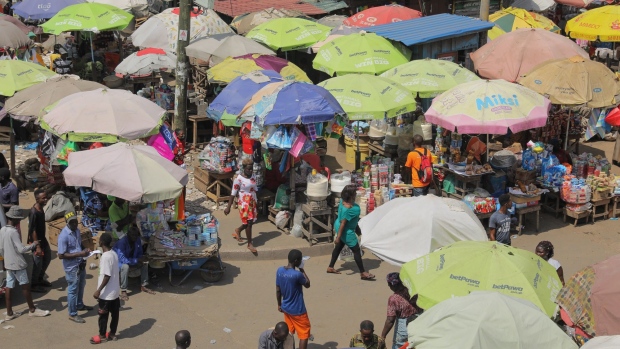Jan 30, 2023
Ghana Central Bank Raises Key Rate by 100 Basis Points
, Bloomberg News

(Bloomberg) -- Ghana’s central bank raised its key interest rate by less than forecast as it expects the government to finalize a deal with the International Monetary Fund by the end of the first quarter, which should help stabilize the cedi and temper inflation.
The monetary policy committee lifted borrowing costs by 100 basis points to 28% to “help drive inflation on a downward path,” Governor Ernest Addison told reporters in Accra, the capital, on Monday. That was less than the median estimate of seven economists in a Bloomberg survey for a 200 basis-point hike.
The move adds to 13.5 percentage points of increases since November 2021 and extends the MPC’s steepest-ever phase of interest-rate hikes.
“We are confident that by the end of the first quarter we should be able to get a disbursement from the IMF to help augment the foreign-exchange resources of the central bank,” Addison said.
The West African nation clinched a staff-level agreement with the IMF on Dec. 12 for a $3 billion bailout to address its precarious public finances. It has taken various steps to contain expenditure this year and rework debt to secure the funds.
“The MPC believes these measures will help restore fiscal and debt sustainability and bring down inflation as well as help stabilize the currency,” Addison said.
The cedi has depreciated by more than a quarter against the dollar since Ghana suspended interest payments on its external debt on Dec. 19. The move caught bondholders by surprise ahead of talks on restructuring the nation’s loans.
The currency was little changed at 12.34 per dollar by 1:49 p.m. in Accra.
The weakness has put pressure on prices. Annual inflation at 54.1% is more than five times the 10% ceiling of the central bank’s target range and has risen 13.7 percentage points since the MPC last met in November.
--With assistance from Simbarashe Gumbo, Zoe Schneeweiss and Yinka Ibukun.
(Updates with quote from central bank governor in sixth paragraph)
©2023 Bloomberg L.P.






